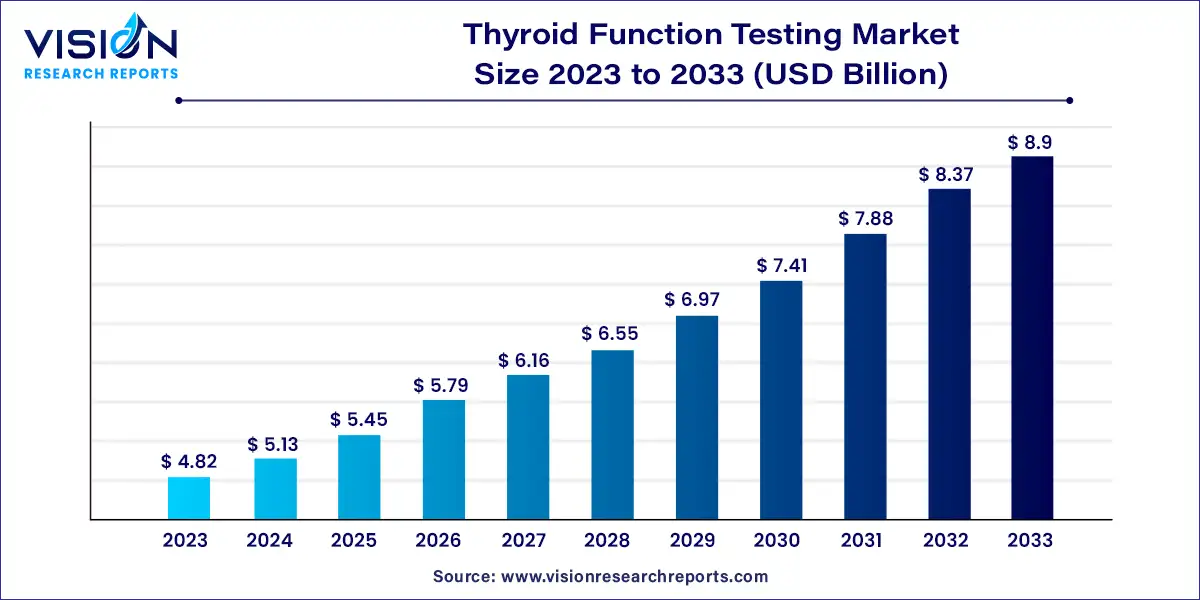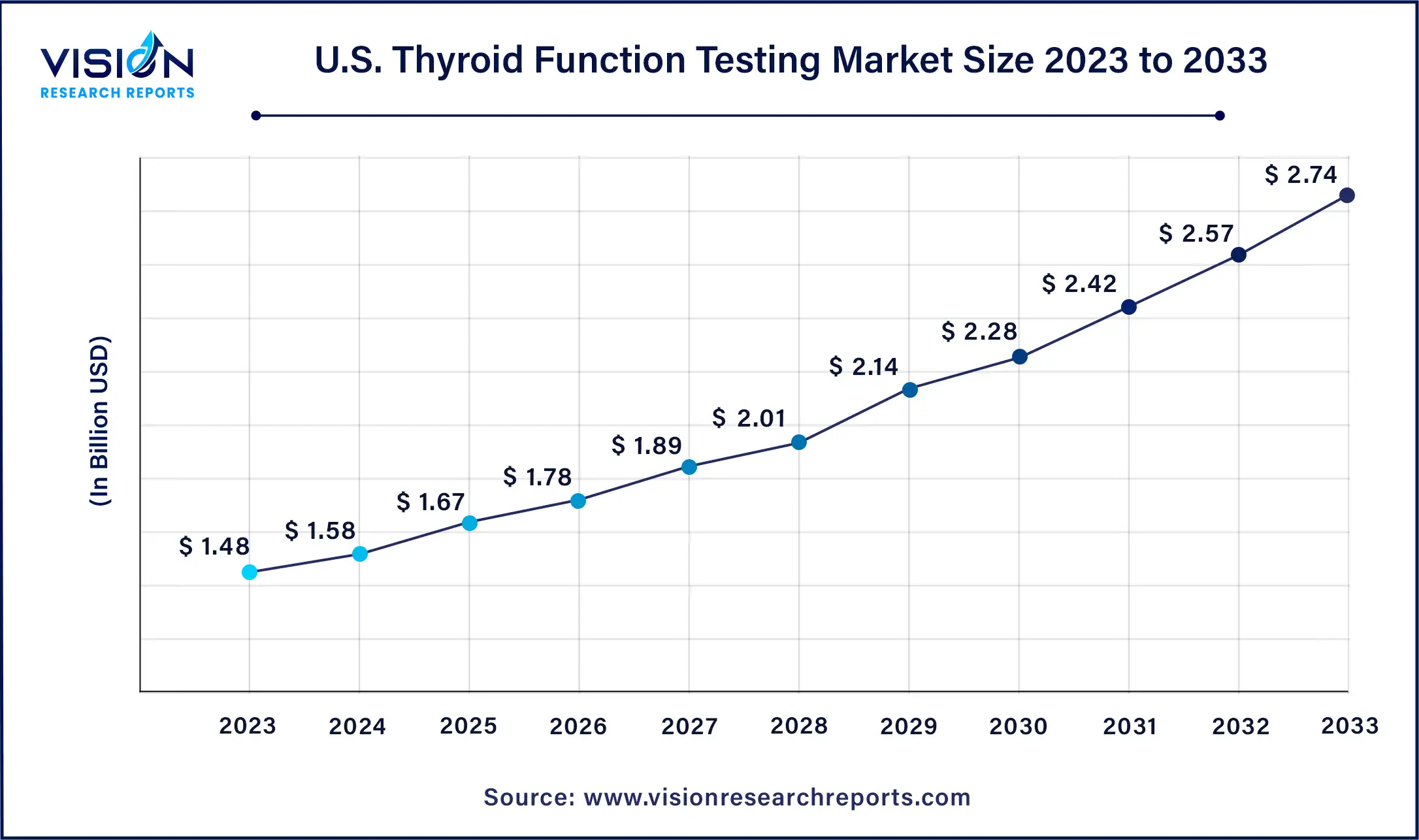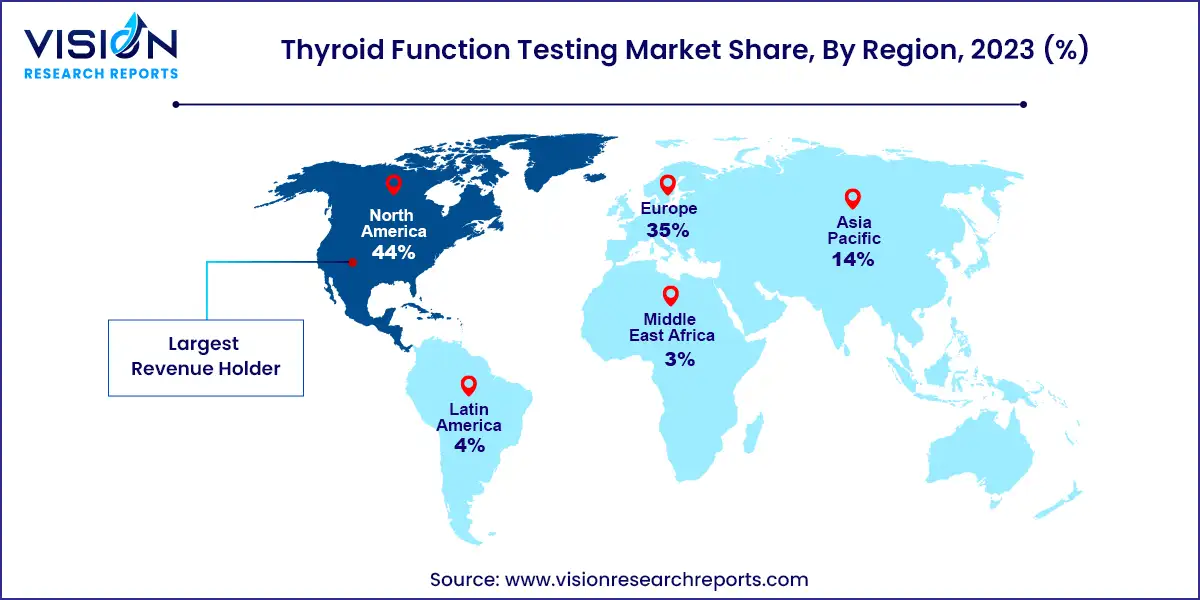The global thyroid function testing market size was estimated at around USD 4.82 billion in 2023 and it is projected to hit around USD 8.9 billion by 2033, growing at a CAGR of 6.33% from 2024 to 2033. The thyroid function testing market presents a dynamic landscape driven by advancements in diagnostic technologies and increasing awareness about thyroid disorders.

The growth of the thyroid function testing market is propelled by an increasing prevalence of thyroid disorders, particularly among the aging population, is driving demand for diagnostic testing. Additionally, growing awareness about the importance of early detection and management of thyroid-related conditions is boosting market growth. Moreover, advancements in diagnostic technologies, such as improved assay methodologies and automation, are enhancing the accuracy and efficiency of thyroid function tests, further fueling market expansion. Furthermore, rising healthcare expenditure and proactive initiatives for disease screening contribute to the market's upward trajectory.
The U.S. thyroid function testing market size was estimated at around USD 1.48 billion in 2023 and it is projected to hit around USD 2.74 billion by 2033, growing at a CAGR of 6.35% from 2024 to 2033.

North America held a significant share of 44% in 2023, primarily due to the heightened prevalence of thyroid disorders in the region. This prevalence is driven by various factors, including iodine deficiency, autoimmune diseases, and shifts in lifestyle patterns. Thyroid conditions are notably common in the United States, where over 12% of the population is expected to develop a thyroid disorder during their lifetime. Presently, an estimated 20 million Americans are affected by some form of thyroid disease. Alarmingly, up to 60% of individuals with thyroid disease are unaware of their condition, underscoring the importance of regular thyroid function testing and raising awareness about thyroid health.

Meanwhile, the thyroid function testing market in the Asia Pacific region is poised to experience the fastest CAGR from 2024 to 2033. This growth is attributed to the increasing prevalence of thyroid disorders, particularly in countries like India and China. There is a growing demand for affordable and accurate diagnostic tests, leading to the adoption of point-of-care testing solutions. Additionally, factors such as improvements in healthcare infrastructure, heightened awareness about thyroid health, and the expansion of key market players' operations in the region contribute to the market's growth potential. The Asia Pacific market presents significant opportunities for industry players and is expected to witness substantial growth in the coming years
The TSH test segment dominated the market, comprising 42% of the market share in 2023, and is expected to exhibit the highest CAGR from 2024 to 2033. TSH tests serve as the recommended initial screening for thyroid dysfunction, employing highly sensitive third-generation immunometric assays since the late 1980s, capable of detecting TSH levels <0.01 mIU/L. Globally, approximately 2 billion individuals are at risk of iodine deficiency, a precursor to thyroid disease. It is estimated that 200 million people worldwide suffer from some form of thyroid disease, with women being disproportionately affected at a ratio of 8:1. The significance of TSH testing serves as a major driving force for the utilization of TSH tests. Moreover, the introduction of technologically advanced products is poised to further propel the segment's growth.
For example, in November 2021, Bloom Diagnostics launched the Bloom Thyroid Test, designed to detect hypothyroidism. This single-use kit enables adults to undergo TSH testing for the detection of thyroid dysfunction. The Bloom Thyroid Test prompts users to disclose information regarding their medication usage, including drugs like Lithium or Amiodarone, which are known to impact thyroid function. Furthermore, the test considers the pregnancy status of women, whether they have recently given birth or are planning to conceive soon. This consideration is crucial because thyroid hormone production increases during pregnancy, making TSH tests unreliable during this period. The free T4 test is expected to witness significant growth at a notable CAGR throughout the forecast period.
The hospitals segment emerged as the market leader, capturing a share of 38% in 2023. Thyroid function testing holds significant importance within hospital settings, serving as a cornerstone for diagnosing and managing various thyroid disorders. Endocrinologists and primary care physicians frequently rely on these tests to precisely evaluate thyroid hormone levels, thereby guiding treatment strategies for conditions such as hyperthyroidism, hypothyroidism, and thyroid nodules. Furthermore, thyroid function tests play a vital role in preoperative assessments and monitoring patients undergoing thyroid hormone replacement therapy or surgical interventions. The segment's growth is propelled by several factors, including the escalating global prevalence of thyroid disorders, heightened awareness among healthcare professionals regarding the significance of early diagnosis, and advancements in diagnostic technologies facilitating rapid and accurate test outcomes.
Moreover, the expanding geriatric population and enhancements in healthcare infrastructure across developing regions contribute significantly to market expansion. Additionally, the diagnostic laboratories segment is poised to witness the fastest CAGR from 2024 to 2033. Diagnostic laboratories play a pivotal role in thyroid function testing, offering a diverse array of tests to evaluate thyroid health comprehensively. One notable trend in this sector is the increasing adoption of automated platforms and immunoassay techniques, which deliver swifter and more precise results. Furthermore, there is a trend towards integrating thyroid function tests into comprehensive wellness panels, enabling more holistic health assessments
By Test Type
By End-use
By Region
 Cross-segment Market Size and Analysis for
Mentioned Segments
Cross-segment Market Size and Analysis for
Mentioned Segments
 Additional Company Profiles (Upto 5 With No Cost)
Additional Company Profiles (Upto 5 With No Cost)
 Additional Countries (Apart From Mentioned Countries)
Additional Countries (Apart From Mentioned Countries)
 Country/Region-specific Report
Country/Region-specific Report
 Go To Market Strategy
Go To Market Strategy
 Region Specific Market Dynamics
Region Specific Market Dynamics Region Level Market Share
Region Level Market Share Import Export Analysis
Import Export Analysis Production Analysis
Production Analysis Others
Others